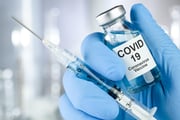Pfizer, Moderna Seek Approval of New COVID Boosters for Kids

MONDAY, Sept. 26, 2022 (HealthDay News) -- Both Pfizer and Moderna have asked the U.S. Food and Drug Administration to approve their updated coronavirus boosters for children.
The "bivalent" shots, like those that adults were able to start receiving this month, target both the original coronavirus and the Omicron BA.4 and BA.5 subvariants.
Pfizer has asked the FDA for approval of its updated booster for children aged 5 to 11. Eligibility for its booster shot is for ages 12 and up.
The company said Monday that it has begun a trial to test the vaccine for safety, tolerability and effectiveness. That trial is in children aged 6 months to 11 years.
Meanwhile, Moderna is seeking approval of its booster for children aged 6 to 11 and adolescents aged 12 to 17. Eligibility for its booster now starts at age 18. The company tweeted that it plans to ask for approval for a booster for children aged 6 months through 5 years later this year.
People who have had their primary vaccine series and are at least age 12 are now eligible for updated boosters, though those who have had the virus recently may want to wait for at least two to three months. Children younger than 12 can still get the original booster shots now, but not the bivalent vaccines.
About 4.4 million adults and adolescents have received the approved new COVID boosters as of last Thursday, according to data from the U.S. Centers for Disease Control and Prevention
More information
The U.S. Centers for Disease Control and Prevention has more on COVID-19 vaccines.
SOURCE: Pfizer Inc., news release, Sept. 26, 2022

The news stories provided in Health News and our Health-E News Newsletter are a service of the nationally syndicated HealthDay® news and information company. Stories refer to national trends and breaking health news, and are not necessarily indicative of or always supported by our facility and providers. This information is provided for informational and educational purposes only, and is not intended to be a substitute for medical advice, diagnosis, or treatment.

